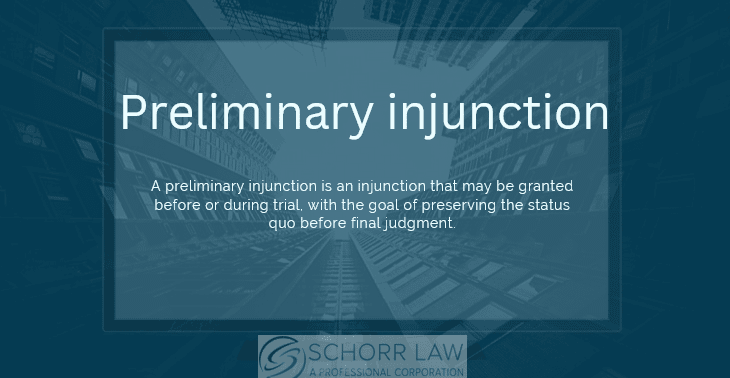

Updated on November 1, 2022
In many of our cases we consider bringing a motion for a preliminary injunction. Before actually bring such a motion, however, we analyze the likelihood for success based on the applicable standards for obtaining a preliminary injunction.

A preliminary injunction is proper where the moving party proves:
“An injunction is a writ or order requiring a person to refrain from a particular act.” Cal. Code Civ. Proc. § 525. Pursuant to Cal. Code Civ. Proc §526, in pertinent part, an injunction may be granted in the following cases:
In deciding whether to issue a preliminary injunction, the trial court should evaluate two factors. “The first is the likelihood that the [moving party] will prevail on the merits at trial. The second is the interim harm that the moving party is likely to sustain if the injunction were denied as compared to the harm that the responding party is likely to suffer if the preliminary injunction were issued.” Metro Traffic Control. Inc. v. Shadow Traffic Network (1994) 22 Cal. App. 4th 853, 858; Universal Life Church. Inc. v. State (1984) 158 Cal. App. 3d 533; IT Corp. v. County of Imperial, (1983) 35 Cal.3d 63, 69.
As the California Supreme Court notes, weighing the relative “equities” is paramount: “By balancing the respective equities of the parties, (the court) concludes that pending a trial on the merits, defendant should or that he should not be restrained from exercising the right claimed by him.” Robbins v. Superior Court (1985) 38 Cal.3d 199, 206. In particular, a party may be enjoined from obtaining funds to which it is not entitled. Mitsui Manufacturers Bank v. Texas Commerce Bank-For Worth (9184) 159 CA 3d 1051, 1057-1058.
It is important to keep in mind that, absent a limited set of exceptions, the Superior Court generally will not grant an injunction where the grounds for seeking the injunction are limited to a party suffering monetary damages.
For help with obtaining an injunction to prevent a harm and to see if you qualify for a free consultation, contact our real estate attorneys in Los Angeles at (310) 954-1877, [email protected] or by using the contact us box on this page.